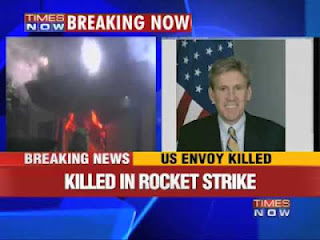Chris Stevens a diplomat or spy
Killing of Christopher Stevens, US Ambassador in Libya and his portrayal as friend of ‘freedom’ fighters raises a question, was he a diplomat or an ace CIA operator? In the recent past many countries have been alleging that spies have become an integral part of the US diplomatic core.
His death has been termed the first death of a US ambassador in the line of duty since 1979. Stevens, 52 and single, served as a special envoy to the Libyan Transitional National Council last year from March to November. During his 21 years in the Foreign Service he also served in Jerusalem, Damascus, Cairo and Saudi Arabia.
President Barack Obama rushed 50 Marines to Libya to safeguard American personnel and critical facilities there, and ordered a worldwide review of security at diplomatic posts. The moves were made amid escalating worries that a deadly attack on the US Consulate in Benghazi stemmed from a carefully planned extremist plot, not a spontaneous riot.
Killing of Stevens can be termed a fall out of operating in the countries the United States wishes to keep its hold. Presence of CIA operators in Pakistan, Afghanistan, Saudi Arabia, Iraq, Kuwait and even Iran has a history spread on decades. New found territories are those falling in ‘uprising in the Middle East and North Africa (MENA).
It has been reported in media, “Stevens, whose diplomatic foothold were a couple of battered tables, was on literally on the rebels’ side while the revolution was at its most vulnerable and in danger of being crushed by troops loyal to Moammar Gadhafi.”
Secretary of State Hillary Clinton, “Stevens will be remembered as a hero by many nations. He risked his life to stop a tyrant then gave his life trying to help build a better Libya. The world needs more Chris Stevenses.”
Hannah Draper, who is in the US on leave from the embassy said, “He loved Libya and Libyan people and died doing what he believed in.” Draper said the ambassador was “legendary” in Libya because he stayed in the country through the revolution, “Liaising with the rebels and leading a skeleton crew of Americans on the ground to support humanitarian efforts and meeting up-and-coming political leaders.”
